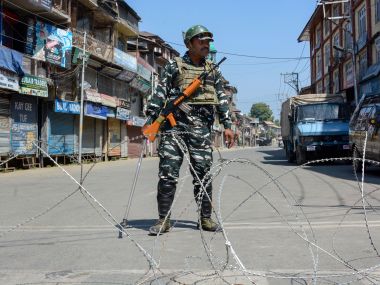On day four of the Supreme Court hearing on petitions challenging the abrogation of Article 370 that accorded special status to Jammu and Kashmir, petitioners sought to emphasise the powers vested with the Assembly of the erstwhile state as was defined in the Instrument of Accession when the region joined India in 1947. They also argued that the Indian Constitution and Jammu and Kashmir’s constitution had been working in tandem through Article 370. [caption id=“attachment_7312671” align=“alignleft” width=“380”] Representational Image. PTI[/caption] Advocate Sanjay Parekh and the Jammu and Kashmir Bar Association, who presented arguments before a five-judge Constitution Bench headed by Justice NV Ramana on Wednesday, submitted that the basis of the IOA was to safeguard the sovereignty of the region. Parekh used sections of the debates of the Constituent Assembly to submit that the writers of the Indian Constitution — including Sardar Vallabhbhai Patel and N Gopalaswami Ayyangar — intended that the “
will of the people be of paramount importance in Jammu and Kashmir”, and that any topic of governance in the region could be enforced only after
consulting the state government. He also stated that the Instrument of Accession (IOA) “made it clear” that no other provisions would be included in the erstwhile state’s constitution and that they wouldn’t accept a “future constitution”. “The Constituent Assembly is ultimately the repository of the will of the people. One sovereignty is the Instrument of Accession and the second is the will of the people. You can’t make a change without the recommendation (of the Constituent Assembly); it is not permissible,” he was
quoted by Live Law as saying.
Advocate Zafar Ahmed Shah, appearing on behalf of the bar association, further asserted the powers given to the state government and said that Clause 8 of the Instrument of Accession directed that “only legislative powers” were given to India. Pointing out the three elements important for any process of accession are the ‘Instrument of Accession’, ‘Standstill Agreement’, and the ‘Merger Agreement’, Shah submitted that since Jammu and Kashmir had not signed the latter two, “it had remained independent”. “This, however gave birth to a peculiar trap of Article 370,” Shah was quoted as saying by Bar and Bench. According to Live Law, the Instrument of Accession is to signify that the region has not seceded fully, the standstill agreement is to indicate that the state of affairs are at a standstill, and the merger agreement is to indicate that the region’s individual existence has ended and that it is “fully merged” with the Union. The ‘peculiar trap’ of Article 370, Shah said, was that it was mandatory for the state government to agree to every decision of the Centre. “The power of the Maharaja emanating from clause 8 of the Instrument of Accession now vested with the State,” he said.
Further, Shah submitted that the Constitution of India and Jammu and Kashmir Constitution existed “hand-in-hand” and that there had not been a conflict because of how Article 370 and other laws were framed. “Both Constitutions have been working hand in hand. Sub clause (2) of Article 370 existed so that there would be no conflict between the Constitution of Jammu and Kashmir and the Indian Constitution,” he said.
Impact Shorts
More Shorts“The abrogation of Article 370 was illegal and it has to be read down. All of a sudden, shockingly, the President of India states that all Constitution Orders are superseded and all provisions of the Constitution will apply to the state of Jammu and Kashmir. Then why not Article 368?” Shah was quoted as saying by Bar and Bench. Stating that the justification given by the government to abrogate Article 370 was “atrocious”, Shah accused the Centre of committing a “constitutional fraud”. He said, “Atrocious that the reasoning given for the CO of 5 August, 2019, was that Jammu and Kashmir was in a bad state, underdeveloped, lacked amenities, infrastructure, etc (sic).”
He also asserted that the Constituent Assembly couldn’t be substituted because “the power of a Constituent Assembly is unlimited, its roots are in the will of the people. It is beyond challenge”. “We have our constitutional autonomy. It is a guaranteed thing to Jammu and Kashmir. It is guaranteed by the Constitution of India and the framework and working of both the constitutions,” Shah added. Shah submitted that the powers of governance were necessary to continue to remain with the people of the region, in consultation with the Centre. “Article 370 subsumes the sovereignty of the State. Within the framework of the constitutions, you have yours and we have ours. This was the method which has been followed in the last 70 years,” he said. While speaking about the Offer of Accession signed by Maharaja Hari Singh in October 1947, Shah stated that the king had included the term ‘referendum’ in the Instrument of Accession. “The ‘so-called separatists’ are the ones who insist on the path of the referendum,” he said, to which Solicitor General Tushar Mehta objected, and said that such statements were not appreciated.


)

)
)
)
)
)
)
)
)



